Ccrn stuvia - Study guides, Class notes & Summaries
Looking for the best study guides, study notes and summaries about Ccrn stuvia? On this page you'll find 37 study documents about Ccrn stuvia.
Page 3 out of 37 results
Sort by
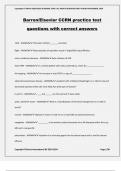
-
Barron/Elsevier CCRN practice test questions with correct answers
- Exam (elaborations) • 30 pages • 2024
- Available in package deal
-
- $12.49
- + learn more
Barron/Elsevier CCRN practice test questions with correct answers ADH - ANSWER-Phenytoin inhibits _______ secretion Right - ANSWER-Most episodes of aspiration result in (right/left) lung infiltrates. urine creatinine clearance - ANSWER-Best indicator of GFR Auto-PEEP - ANSWER-In a vented patient with status asthmaticus, check for _______________ Air trapping - ANSWER-An increase in auto-PEEP is a sign of _________________. obstructive pulmonary disease - ANSWER-A patient with a flattened ...
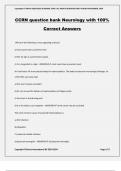
-
CCRN question bank Neurology with 100% Correct Answers
- Exam (elaborations) • 17 pages • 2024
- Available in package deal
-
- $12.49
- + learn more
CCRN question bank Neurology with 100% Correct Answers Which of the following is true regarding scoliosis? a) most cases have a juvenile onset b) the 1st sign is a prominent scapula c) it is congenital in origin - ANSWER-most cases have a juvenile onset A 6 mof had a VP shunt placed today for hydrocephalus. The baby has become increasingly lethargic. As a PICU RN, you know that a) the shunt may be occluded b) its not unusual for babies w/ hydrocephalus to fatigue easily c) the shunt is...
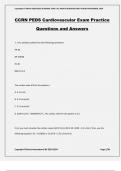
-
CCRN PEDS Cardiovascular Exam Practice Questions and Answers
- Exam (elaborations) • 38 pages • 2024
- Available in package deal
-
- $12.49
- + learn more
CCRN PEDS Cardiovascular Exam Practice Questions and Answers 1. Your pediatric patient has the following parameters HR 80 BP 100/60 SV 40 BSA 0.9 m2 The cardiac index (CI) for this patient is A. 4.4 L/min B. 3.2 L/min/m2 C. 3.5 L/min/m2 D. 3200 mL/m2 - ANSWER-C. The cardiac index for this patient is 3.5. First, you must calculate the cardiac output (HR X SV) or (80 X 40 =3200 = 3.2 L/min). Then, use the following equation: (CI = CO/BSA) or (3.2/0.9 = 3.55 L/min/m2) Copyright © KAY...
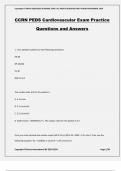
-
CCRN PEDS Cardiovascular Exam Practice Questions and Answers
- Exam (elaborations) • 38 pages • 2024
- Available in package deal
-
- $13.49
- + learn more
CCRN PEDS Cardiovascular Exam Practice Questions and Answers 1. Your pediatric patient has the following parameters HR 80 BP 100/60 SV 40 BSA 0.9 m2 The cardiac index (CI) for this patient is A. 4.4 L/min B. 3.2 L/min/m2 C. 3.5 L/min/m2 D. 3200 mL/m2 - ANSWER-C. The cardiac index for this patient is 3.5. First, you must calculate the cardiac output (HR X SV) or (80 X 40 =3200 = 3.2 L/min). Then, use the following equation: (CI = CO/BSA) or (3.2/0.9 = 3.55 L/min/m2) Copyright © KAY...
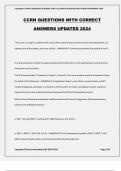
-
CCRN QUESTIONS WITH CORRECT ANSWERS UPDATED 2024
- Exam (elaborations) • 39 pages • 2024
- Available in package deal
-
- $13.49
- + learn more
CCRN QUESTIONS WITH CORRECT ANSWERS UPDATED 2024 The nurse is caring for a patient with acute inferior wall MI, post-coronary artery stent deployment, For optimal care of the patient, the nurse should: - ANSWER-Continuously monitor the patient in lead II It is best practice to monitor the patient status post PCI with stent, in the lead that was most abnormal during the acute occlusion. The ECG demonstrates ST elevation in leads II, III and aVF. The nurse needs to monitor the patient closel...

-
CCRN Exam Questions and Correct Answers | A Grade
- Exam (elaborations) • 24 pages • 2024
- Available in package deal
-
- $12.49
- + learn more
CCRN Exam Questions and Correct Answers | A Grade A 56 yr-old male is admitted to the ICU with a blood pressure of 225/135 and complains of a headache and nausea. He reports he ran out of blood pressure meds three days ago, but also appears to be confused to the date and situation. What is the most appropriate treatment approach? - ANSWER- Rapidly lower the diastolic pressure to 100 with IV antihypertensive meds, then continue to gradually reduce the diastolic pressure to 85 with oral anti...
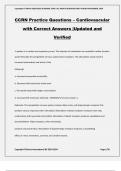
-
CCRN Practice Questions – Cardiovascular with Correct Answers |Updated and Verified
- Exam (elaborations) • 35 pages • 2024
- Available in package deal
-
- $13.49
- + learn more
CCRN Practice Questions – Cardiovascular with Correct Answers |Updated and Verified A patient is in cardiac and respiratory arrest. The selection of medications to reestablish cardiac function would stimulate the sympathetic nervous system beta1 receptors. This stimulation would result in increased automaticity and which of the following? a. Increased myocardial contractility b. Decreased left ventricular stroke work c. Decreased myocardial oxygen consumption d. Increased left ventri...
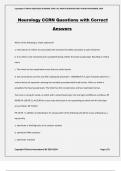
-
Neurology CCRN Questions with Correct Answers
- Exam (elaborations) • 21 pages • 2024
- Available in package deal
-
- $12.49
- + learn more
Neurology CCRN Questions with Correct Answers Which of the following is a false statement? a. head injuries in infants are associated with increased mortality secondary to open fontanels. b. if an infant is not restrained and is propelled during a MVA, the head usually leads. Resulting in critical injury c. The infant has less myelinated nerves that are easily injured. d. the cranial bones are thin and offer inadequate protection - ANSWER-A, open fontanels allow for a certain decree of e...
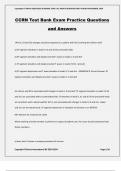
-
CCRN Test Bank Exam Practice Questions and Answers
- Exam (elaborations) • 16 pages • 2024
- Available in package deal
-
- $12.49
- + learn more
CCRN Test Bank Exam Practice Questions and Answers Which 12-lead ECG changes should be expected in a patient with ACS involving the inferior wall? a) ST segment elevation in leads II, III and all the precordial leads b) ST segment elevation and deeply inverted T waves in leads II, III and AvF c) ST segment elevation and deeply inverted T waves in leads V4-V6, I and aVL d) ST segment depression and T wave elevation in leads II, III and AvL - ANSWER-Correct Answer: ST segment elevation and ...
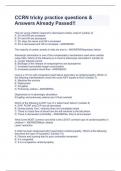
-
CCRN tricky practice questions & Answers Already Passed!!
- Exam (elaborations) • 37 pages • 2023
-
- $11.99
- + learn more
How do young children respond to decreased cardiac output? (cardiac 3) A. SV and HR are increased B. SV and HR are decreased C. SV stays the same and HR is increased D. SV is decreased and HR is increased - ANSWERSC The majority of cardiac arrests in kids are due to - ANSWERSRespiratory failure Adrenergic stimulation is one of the compensatory mechanisms used when cardiac output fails. Which of the following is a result of adrenergic stimulation? (cardiac 6) A. Longer diastolic per...

Did you know that on average a seller on Stuvia earns $82 per month selling study resources? Hmm, hint, hint. Discover all about earning on Stuvia


